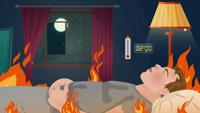(Photo by Marcus Aurelius via Pexels)
By Stephen Beech
People are losing an average of 15 to 17 minutes of sleep each night due to global warming, according to new research.
And the likelihood of experiencing “short sleep” – defined as less than six hours per night – increases by around 40% during heatwaves, say scientists.
The international study, led by sleep experts at Flinders University in Australia, reveals that rising temperatures are silently chipping away at our sleep and our health, too.
The findings, published in the journal Sleep, show that warmer nights are causing “widespread” reductions in shuteye duration around the world.
A new study finds that warmer nights are causing widespread reductions in sleep duration across the globe. (Flinders University via SWNS)
Analyzing in excess of 165 million nights of sleep data from more than 317,000 users of wearable and under-mattress sleep tracking devices, the research team found that when temperatures rise from the global median of 12 degrees Celsius (53.6 Fahrenheit) to 27C (80.6 Fahrenheit), people lose an average of 15 to 17 minutes of sleep.
Study lead author Dr. Bastien Lechat, of Flinders Health and Medical Research Institute (FHMRI), said: “Sleep is essential for physical and mental health, and our findings show that high temperatures are quietly undermining this fundamental biological need.
“This isn’t just about our comfort, it’s about our cognition, mood, immune function, and long-term overall well-being.”
(Photo by Kampus Production via Pexels)
The findings are part of a large-scale research project, led by Flinders University, exploring the impact of rising temperatures and changing environmental conditions and how they affect sleep health to help project the long-term consequences of global warming.
Study co-first author and biostatistician Barbara Toson says the study used validated consumer sleep tracking devices and took into account environmental factors such as humidity, air pollution, and cloud cover.
She said: “This is one of the most comprehensive analyses of sleep and climate to date.
“We’ve shown that the relationship between temperature and sleep is robust across devices, regions, and demographics and clearly shows that heat-induced sleep loss is impacting people of all ages and health backgrounds.”
Senior researcher Professor Danny Eckert says that the implications are far-reaching.
Co-lead authors, Dr. Bastien Lechat and Barbara Toson. (Flinders University via SWNS)
He said: “Sleep deprivation is linked to depression, cardiovascular disease, impaired cognitive function, and increased risk of accidents.
“As global temperatures continue to rise, the burden of sleep-related health issues is likely to grow too.”
Dr. Lechat says that there are ways to adapt and protect sleep in warmer times.
He said: “Urban design, housing, and public health strategies such as using heat-resilient housing designs and urban cooling strategies, such as green roofs, tree planting, and reflective building materials, could help.
(Photo by Mikhail Nilov via Pexels)
“We can also take steps to safeguard our own sleep, such as keeping bedrooms cool with fans, air conditioning or breathable bedding, which can help your body rest.
“Closing blinds and sunny-side windows during the day to block heat, and opening them at night if there is a late cool breeze, can also protect bedrooms from heating up.”
Dr. Lechat added: “Drinking water regularly and avoiding caffeine to stay hydrated helps your body regulate temperature and sleep better, and avoiding heavy meals and alcohol before bed can help to reduce sleep disruption.”







